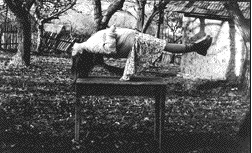 |
Vol 0, No 9
23 November 1998 |
|
|
 K I N O E Y E:
K I N O E Y E:Slovakia Discovered (Part I) Martin Sulik's Zahrada Andrew J Horton It might be tempting to think that because Slovakia has such a minuscule film output, its cinema must, therefore, in some ways be less developed and less interesting than that of other countries. Nothing could be further than the truth. Those who have already foolishly leaped to such hasty conclusions should rush to see Martin Sulik's hit 1995 film Zahrada (The Garden). London audiences were recently given the benefit of seeing Sulik's most popular film as part of the Slovakia Discovered festival. The film's popularity is easily understood. Sulik carries on from where his previous successful film Vsetko, co mam rad (Everything I Like, 1992) took off. The two films share much in common: light comedy, chapter divisions, tense personal relationships, stunning photography of the Slovak countryside, a love of irrational responses and the hauntingly simple music of Vladimir Godar. The father/son relationships in the two films particularly invite comparison. The son this time is Jakub, in his way just as much a drifter as Vsetko, co mam rad's Tomas. Sick of Jakub's constant loafing, outraged by his wild and passionate affair with one of his married clients, and disgusted by his incontinent cat, Jakub's father kicks the wayward son out of the house and tells him to go to the deserted house in the country which was built by his grandfather in the early days of the First Czechoslovak Republic. Although a fine building in its day, it is now in an extreme state of disrepair. Jakub's attempts to put the house in some sort of order mirror his attempts to straighten out his personal life. In both he finds new sources of wonder. Hidden in his grandfather's bed he finds the old man's journal, written, like Leonardo's, in backwards handwriting. The book praises the three things important to any self-respecting Slovak: god, a life close to the land and home-made slivovica (plum schnapps). Meanwhile, Jakub meets a number of curious characters, who are, or at least bare the same name as, philosophers and religious figures. The most important of these is Helena, a sixteen-year-old with the fresh-faced look of the late 60s who the narrator describes as "the miraculous virgin." Her mother denounces her as completely mad, but Jakub thinks otherwise. Method in the madness? The girl teaches Jakub to understand the wisdom of the irrational when she cures him by standing with him in an ants' nest and paints his legs white to stop rabbits from nibbling at him in winter. Having been taught how to write by Jakub's grandfather - her only education - she writes backwards, something Jakub now tries to master. His father joins in the fun when they both shave each others heads. Even the cat turns out to be a disciple of Helena's philosophy, successfully bringing her out of a coma.
Although Zahrada is definitely a film from the Sulik mould, it is at the same time rather different. Whilst Vsetko, co mam rad revolved around realism, Zahrada is centred on a fairy-tale mysticism. Any realism in it is magic realism, an embodiment of fantasy rather than a representation of reality. Sulik's characters manage to be both mythical archetypes and the result of careful observation of modern life. So skilful is this blend that Zahrada has become the quintessential Sulik film, and Sulik has bemoaned the fact that nobody is interested in his more recent film Orbus Pictus (1997), because they are so enamoured with Zahrada. Universal appeal The film succeeds because it appeals to the Slovak in us (and, yes, there is a little of Slovakia in everyone!). Who can not be enchanted by the desire to shake off everything that entraps us and return to a beautiful Garden of Eden where a simpler, more fulfilling life will teach us everything and where everything will be as it should be. Sulik's seductive vision of biblical purity blended with hard liquor and Pythonesque antics places it as heir to the Slovak happenings of the late sixties and early seventies, as, for instance, documented by Dusan Hanak in his short film Den radosti (Day of Joy, 1972) (Click here for a Kinoeye review) Sulik, like all Slovak directors seem to these days, complained that his next project was in difficulty because of the problems of finding money, an activity that appears to consume more of a Slovak directors' time than any other part of the film-making process. However, Sulik is comparatively lucky. With three films to his name this decade, he is by Slovak standards prolific. We can but hope that in the very near future someone will come to their senses and realise the potential appeal of a director like Sulik to international audiences and put the appropriate effort into marketing the films properly. It's tragic to say but Slovakia Discovered is not the way the films deserve to be marketed. All the films at the festival were very Slovak in some way, but to market them as such is to kill their appeal to an international audience. When I saw Zahrada I was one of only a handful of viewers, the others consisting of ex-pats and academics specialising in the area. To reach a wider audience Slovak cinema needs to be marketed as "good cinema," not as "Slovak cinema." Although, of course, it is both. Andrew J Horton, 23 November 1998
|
|
![]()
Copyright (c) 1999 - Central Europe Review and Internet servis, a.s.
All Rights
Reserved
 Complete reconciliation between father and son (and father and cat) comes when Jakub's father leaves the city to come and live with his son. With his new philosophical perspective, Jakub has also rejected urban life and refuses to go back to the school where he teaches when term starts. He abandons his old lustful affair with Teresa in favour of his companionship with Helena. By the time Helena decides to levitate above a table (for no apparent reason, of course), Jakub is completely in tune with her way of thinking and does not bat an eyelid. Although surprised by this unnatural occurrence, Jakub's father is forced upon seeing the air-borne virgin to concede that "at last, everything is as it should be."
Complete reconciliation between father and son (and father and cat) comes when Jakub's father leaves the city to come and live with his son. With his new philosophical perspective, Jakub has also rejected urban life and refuses to go back to the school where he teaches when term starts. He abandons his old lustful affair with Teresa in favour of his companionship with Helena. By the time Helena decides to levitate above a table (for no apparent reason, of course), Jakub is completely in tune with her way of thinking and does not bat an eyelid. Although surprised by this unnatural occurrence, Jakub's father is forced upon seeing the air-borne virgin to concede that "at last, everything is as it should be."